Commentary
In May, with the support of the opposition and the left-wing Greens, the Queensland state Parliament adopted the Path to Treaty Act 2023.

In May, with the support of the opposition and the left-wing Greens, the Queensland state Parliament adopted the Path to Treaty Act 2023.